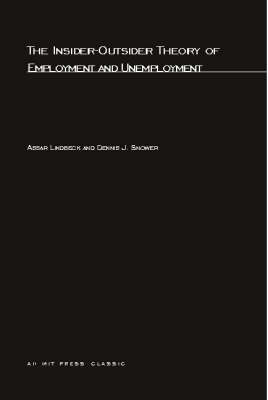The MIT Press
2 total works
Turning Sweden Around
by Assar Lindbeck, Per Molander, Torston Persson, Olof Peterson, Agnar Sandmo, Birgitta Swedenborg, and Niels Thygesen
Published 7 June 1994
What lessons does the current economic crisis in Sweden offer for other economies? Written in a clear and precise style and using modern theories of macroeconomics and economic policy to analyze Sweden's serious economic situation, this text outlines recommendations for change unusual and provocative. Combining economic and political analysis it covers wide-ranging areas and broad structural issues that encompass the necessity for institutional reforms as well as economic change. The plunge in Sweden's economy has taken many by surprise, showing how much more vulnerable Sweden has been to macroeconomic disturbance than previously believed. Since 1990 industrial output has fallen dramatically, total unemployment has grown to 12 percent, the public sector deficit is 13 percent of GDP, and since the country shifted to a floating exchange rate last fall, the krona has depreciated by more than 20 percent.
The authors identify the deficiencies of Sweden's economic and political institutions, and suggest remedies that cut across virtually all aspects of economic and political life: product and factor markets, the system of wage formation, the public sector, and central and local government. They show that many of the current problems stem from an unclear division of responsibilities, describing a government that has taken on so many tasks that it is unable to fulfill its core obligations. Three chapters tackle the basic problems in the Swedish economy, namely stability, efficiency and growth - while a fourth chapter suggests how to change the political system to strengthen democracy.
The authors identify the deficiencies of Sweden's economic and political institutions, and suggest remedies that cut across virtually all aspects of economic and political life: product and factor markets, the system of wage formation, the public sector, and central and local government. They show that many of the current problems stem from an unclear division of responsibilities, describing a government that has taken on so many tasks that it is unable to fulfill its core obligations. Three chapters tackle the basic problems in the Swedish economy, namely stability, efficiency and growth - while a fourth chapter suggests how to change the political system to strengthen democracy.
The Insider-Outsider Theory of Employment and Unemployment
by Assar Lindbeck and Dennis J. Snower
Published 1 January 1988
This book provides an accessible, balanced account of the insider-outsider theory of labor market activity. It focuses on how "insiders" (incumbent employees whose jobs are protected by various labor turnover costs) get market power, what they do with that power, and how their activities affect the "outsiders" (who are either unemployed or work in the informal sector). The book examines the effects of insiders' activities on wages, employment, and unemployment; discusses the associated policy implications; and relates the insider-outsider theory to other theories of labor market activity. The central part of the book consists of a series of previously published articles that have been edited to convey a single coherent account of the insider-outsider theory. Chapters are preceded by overviews summarizing the main ideas and relating them to the book's underlying theme.

